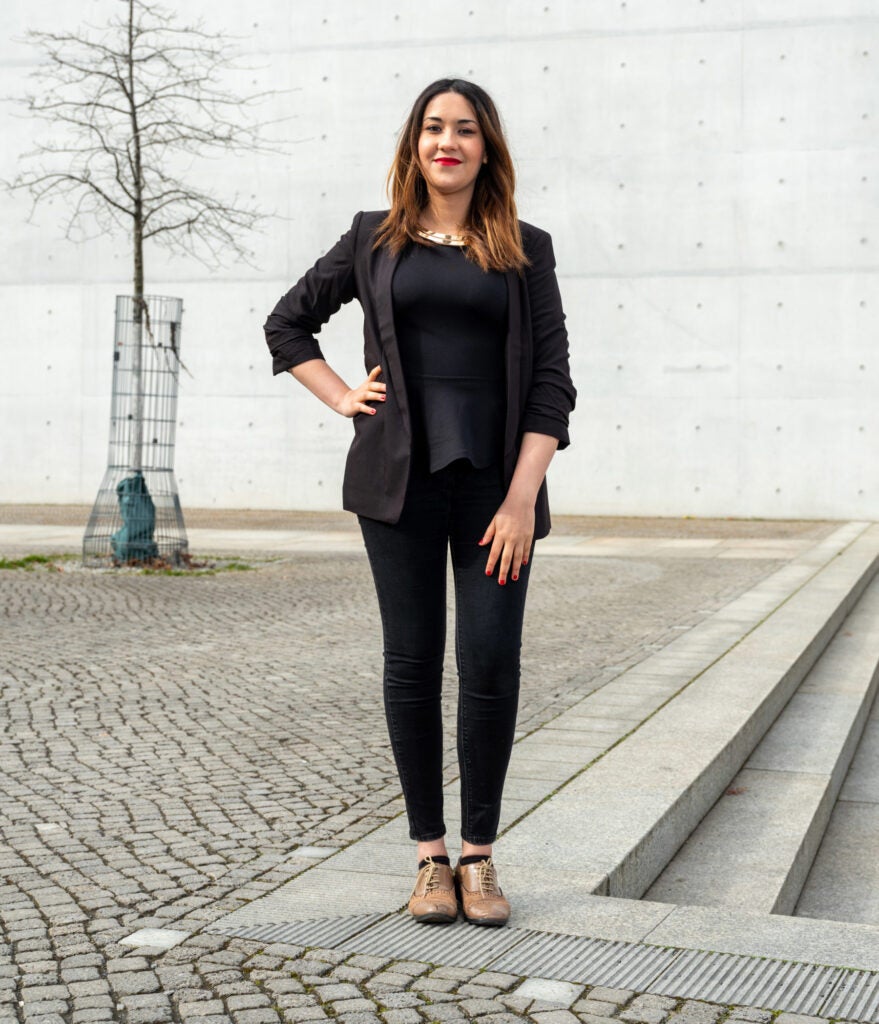via Harvard Law Today
by Julia Hanna

Ikram Ais LL.M. ’21 was 8 years old when she realized her mother could not read or write. “I asked for help with my homework and she just sat there,” recalls Ais, who grew up in a small town outside Oran, Algeria. Ais learned that her mother’s parents hadn’t believed in education for young girls, which made her sad, she says — and angry. “I’m one of 11 siblings — our house was always crowded,” she recalls. “My mother says I would get up on a table with a hairbrush and shout about how everyone should be treated equally. I had no clue what I was talking about, but I knew there was some discrimination against women and I did not like it.” She taught her mother Arabic, letter by letter. Without realizing it, she had found her life’s mission as an advocate for human rights.
Ais has been immersed in a blend of advocacy, legal scholarship, and community building.
That moment took on more meaning as Ais grew older. “My [female] cousins were dropping out of school and getting married at the age of 16, which is the norm in Algeria,” she says. She also witnessed — and experienced — domestic violence and abuse. “It made me scared of what the future looked like for all of these women.”
The summer after she graduated from high school, Ais became involved in Amnesty International; after participating in a human rights training program in the capital city of Algiers, she returned to Oran to launch a group of student activists at her university, leading them in some of the same training exercises and boosting female involvement. In time, she was elected to the executive board of Amnesty International Algeria — its youngest board member to date — and found herself taking the train 250 miles from Oran to Algiers for meetings. “I was harassed countless times for traveling by myself,” she says. Yet it did not diminish her resolve, as she went on to post-university stints at several Berlin-based nonprofits focused on conflict resolution and human rights.
Berlin, as it happens, is where she’s spent her LL.M. year; while she wishes it could have been otherwise, Ais, who was an HLS class marshal, fostered a sense of virtual community through a number of efforts, including a movie club. Members voted for the 1966 classic “The Battle of Algiers” for the first screening. After watching together on Kanopy, Ais says participants debated which group could be considered the oppressors — the Algerians, the French, or both? “The movie and the discussion lasted four hours,” she says, “but no one was bored, not for a minute.”
Ais cites Feminist Legal Theory with Professor Janet Halley as just one of many favorite HLS courses: “She wouldn’t give her opinion but would challenge you to understand how different scholars could view an issue, as a way to improve your thinking and point of view.” Comparative Constitutional Law with Professor Vicki Jackson was another highlight. And Ais wrote her LL.M. paper, supervised by Professor Martha Minow, on how women’s rights and domestic violence rates changed after constitution-building efforts in Algeria and Japan.

Credit: Michael Danner/Getty ImagesFocusing on the connections between constitutional structures, government, business, and a healthy human rights climate has been a through line of Ikram Ais’ work at HLS.
Focusing on the connections between constitutional structures, government, business, and a healthy human rights climate has been a through line of Ais’ work at HLS; in the International Human Rights Clinic, she and others drafted a critique of the United Nations’ guiding principles on business and human rights, which currently center on state, judicial, and corporate responsibility. “Our critique adds a fourth pillar to the document to include community and the people themselves,” she says. “It’s been an amazing learning experience.”
Ais would like to return to Algeria at some point to contribute to her home country’s progress in human rights, and more broadly, to the Middle East and North Africa region. This spring, as co-director of activism for HLS Advocates for Human Rights (a newly created role), she worked to bring attention to the fate of four Yemeni journalists detained since 2015 and sentenced to death in April 2020 in a campaign that included reaching out to President Joe Biden.
Intrigued by the intersection of activism and academia, Ais plans to continue to find ways to expand her knowledge of the role constitutions and legislation play in preserving regional stability and, by extension, human rights. In the meantime, she continues the work begun when she was just 8 years old, teaching her mother Arabic letter by letter. “I keep educating every single woman I communicate with from Algeria, whether on the phone or online, of how important it is to raise her voice and not accept oppression,” she says. “I really would like to continue the sort of advocacy and legal scholarship work that will bring stability and improved human rights to my home region.”
Filed in: Clinical Student Voices
Contact Office of Clinical and Pro Bono Programs
Website:
hls.harvard.edu/clinics
Email:
clinical@law.harvard.edu